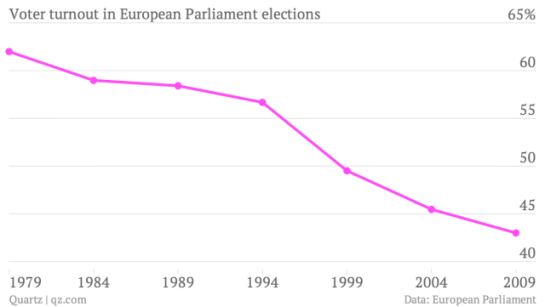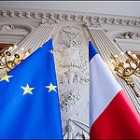
CC/Flickr/Rock Cohen
We are now halfway through the 2014 European elections, and no matter which way things go, we will have to own up to our choices (or the lack thereof) for the next five years. Yet on Thursday, British and Dutch citizens went to the voting booths in record-low numbers (less than 35% in the Netherlands).
The European Parliament arguably has more power than ever in influencing the workings of the Union and is the only directly-elected institution within it. Yet EU citizens care less and less at every election.

Voter turnout in the European Parliament Elections. Picture credit: Quartz
No matter whether you are pro-EU or eurosceptic, the Union and its member states are at a turning point: the aftermath of the economic crisis, the negotiations surrounding the Transatlantic Trade and Investment Partnership (TTIP) with the United States of America, the diplomatic crisis with Russia, the digital transition undergone by our society, and, most importantly, the repositioning of European member states within the global order…
Part of the answer will happen through the European Union. For better or worse, its institutions have changed the lives of hundreds of millions of European citizens through the internal opening of its borders, its agricultural policies, its fight for civil rights, etc. Whether it is to take apart, or to make it stronger, citizens must take it upon themselves to show up at the booth to make their preference is taken into account.
This year in particular, the votes gathered by European parties should actually impact the election of the President of the EU Commission as a result of the 2010 Lisbon Treaty. Critics pointed to statements from Angela Merkel and Herman Van Rompuy indicating the European Council may present an outside candidate for the post (such as Frenchwoman Christine Lagarde), but few have talked of the reaction of the future eurodeputies: parties such as ALDE, the EPP or the S&D indicated they would shut down the European Parliament if they were imposed an outsider, yet stressing again the growing importance of the elected body.
People often complain the European Union is not democratic enough, but how can we believe they really do want to participate in its decision making if they pass out on the EP elections? Go vote if you haven’t done so already.
Party candidates for the EU Commission Presidency
*EPP – center-right: Jean-Claude Juncker (Luxembourg)
*S&D – center-left: Martin Schulz (Germany)
*ALDE – liberals: Guy Verhofstadt (Belgium)
*Greens: Ska Keller/José Bové (Germany & France)
*European Left: Alexis Tsipras (Greece)



